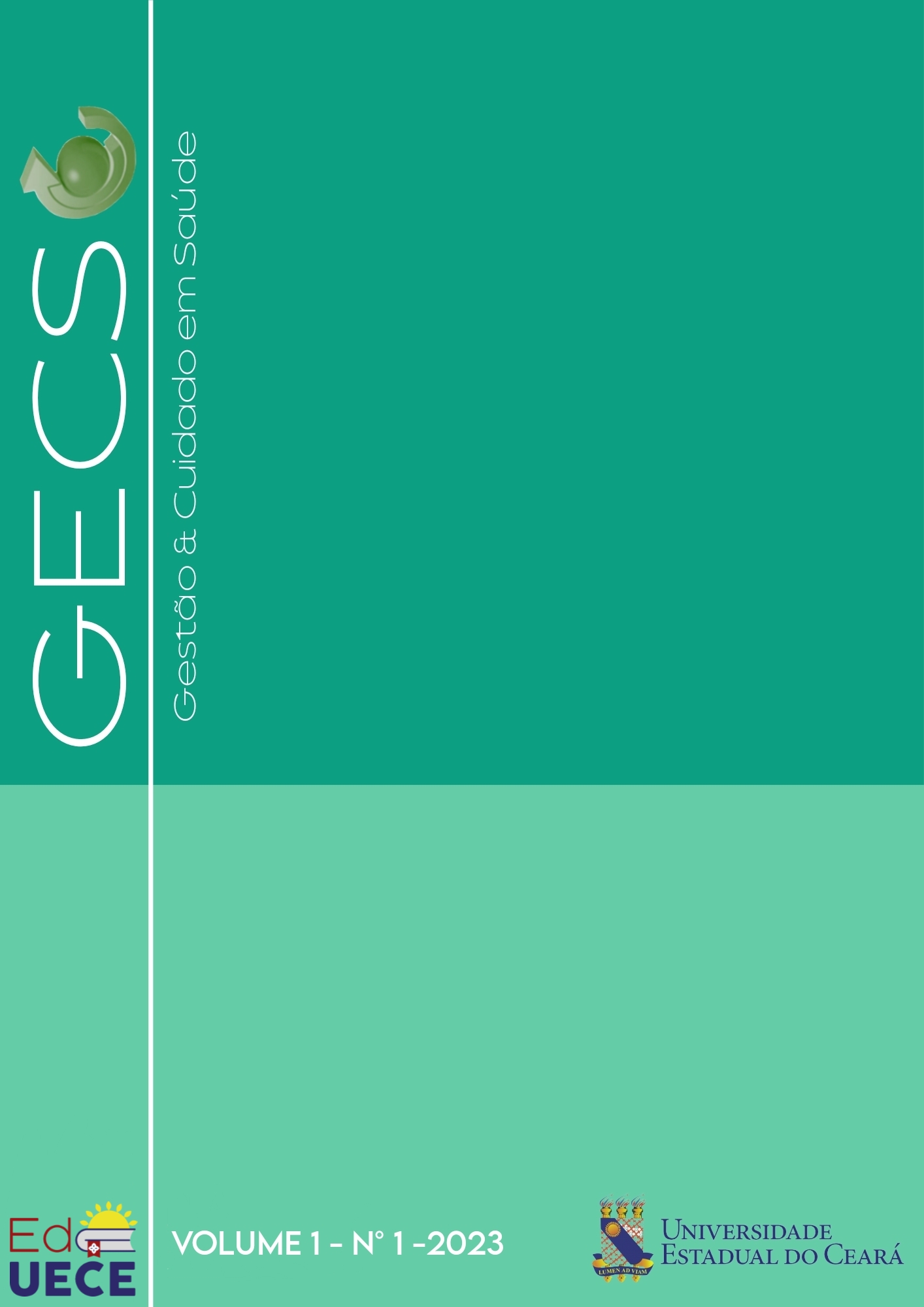Comportamento alimentar em mulheres negras puérperas com obesidade
DOI:
https://doi.org/10.70368/gecs.v1i1.12204Palavras-chave:
Puerpério, Obesidade, Comportamento AlimentarResumo
Este trabalho busca descrever o comportamento alimentar de mulheres negras puérperas com obesidade. Trata-se de um estudo transversal, em que foram incluídas 82 mulheres negras com obesidade no puerpério. Avaliou-se as características sociodemográficas, gestacionais, antropométricas e o comportamento alimentar das puérperas. O comportamento alimentar foi avaliado através do Questionário Holandês de Comportamento Alimentar. Empregou-se análise de componentes principais para evidenciar as três dimensões do Questionário Holandês de Comportamento Alimentar (i.e., emocional, restritivo e externo), considerando carga fatorial >0,4 e <-0,4. As análises formam realizadas no software SPSS 22.0. A média de idade das mulheres foi de 29 anos (±5,7) e o Índice de Massa Corporal atual diagnosticou Obesidade Grau 2 (33,8 ±3,85). Mais de 70% das voluntárias realizaram 7 consultas ou mais durante o pré-natal. O comportamento alimentar com maior pontuação média foi o comportamento alimentar externo (30 ±5,7), seguido do comportamento alimentar emocional (26 ± 6,8) e comportamento alimentar restritivo (22 ±3,1). Mulheres negras puérperas com obesidade apresentaram três dimensões de comportamento alimentar, em que o comportamento alimentar externo apresentou maior sobressalência entre as investigadas.
Referências
ALVARENGA, M.S.; SCAGLIUSI, F. B.; PHILIPPI, S.T. Comportamento de risco para transtorno alimentar em universitárias brasileiras. Archives of Clinical Psychiatry (São Paulo), v. 38, p. 03-07, 2011. Disponível em: https://www.scielo.br/j/rpc/a/hMmvJxRbLYtWm6ktCmFyY3w/. DOI: https://doi.org/10.1590/S0101-60832011000100002
ALMEIDA, G. A. N; LOUREIRO, S. R; SANTOS, J. E. Obesidade mórbida em mulheres – Estilos alimentares e qualidade de vida. Arch Latinoam Nutr.; v. 51, n. 4, p. 359-65, 2001. Disponível em: https://ve.scielo.org/scielo.php?script=sci_arttext&pid=S0004-06222001000400006.
ASHLEY, W. The angry black woman: the impact of pejorative stereotypes on psychotherapy with black women. Social work in public health, v. 29, n. 1, p. 27–34, 2 jan, 2014. Disponível em: https://pubmed.ncbi.nlm.nih.gov/24188294/. DOI: https://doi.org/10.1080/19371918.2011.619449
BAILEY, Z. D. et al. Structural racism and health inequities in the USA: evidence and interventions. Lancet (London, England), v. 389, n. 10077, p. 1453–1463, 2017. Disponível em: https://pubmed.ncbi.nlm.nih.gov/28402827/. DOI: https://doi.org/10.1016/S0140-6736(17)30569-X
BIGGS, S.; HAAPALA, I. Intergenerational commensality: A critical discussion on non‐familial age groups eating together. International Journal of Environmental Research and Public Health, v. 18, n. 15, 2021. Disponível em: https://pubmed.ncbi.nlm.nih.gov/34360195/. DOI: https://doi.org/10.3390/ijerph18157905
BILICI, S. et al. Factors affecting emotional eating and eating palatable food in adults. Nutrition Research and Practice, v. 14, n. 1, p. 70, 2020. Disponível em: https://www.ncbi.nlm.nih.gov/pmc/articles/PMC6997140/. DOI: https://doi.org/10.4162/nrp.2020.14.1.70
BROWN, A. Maternal restraint and external eating behaviour are associated with formula use or shorter breastfeeding duration. Appetite, v. 76, p. 30–35, 2014. Disponível em: https://pubmed.ncbi.nlm.nih.gov/24463067/. DOI: https://doi.org/10.1016/j.appet.2013.12.022
CREAR-PERRY, J. et al. Social and Structural Determinants of Health Inequities in Maternal Health. Journal of women’s health (2002), v. 30, n. 2, p. 230–235, 2021. Disponível em: https://pubmed.ncbi.nlm.nih.gov/33181043/. DOI: https://doi.org/10.1089/jwh.2020.8882
DAVIS, D. A. Obstetric Racism: The Racial Politics of Pregnancy, Labor, and Birthing. Medical anthropology, v. 38, n. 7, p. 560–573, 2019. Disponível em: https://pubmed.ncbi.nlm.nih.gov/30521376/. DOI: https://doi.org/10.1080/01459740.2018.1549389
DE QUEIROZ, F. L. N. et al. Eating Competence, Food Consumption and Health Outcomes: An Overview. International journal of environmental research and public health, v. 19, n. 8, 2022. Disponível em: https://pubmed.ncbi.nlm.nih.gov/35457352/. DOI: https://doi.org/10.3390/ijerph19084484
EXUM, A. C.; TEMPLIN, J.; FAZZINO, T. L. Bridging gaps by including culture: Development and empirical test of the culturally informed theory for disordered eating among Black women. Eating behaviors, v. 44, 2022. Disponível em: https://pubmed.ncbi.nlm.nih.gov/35152181/. DOI: https://doi.org/10.1016/j.eatbeh.2022.101600
FARPOUR-LAMBERT, N. J. et al. Obesity and Weight Gain in Pregnancy and Postpartum: an Evidence Review of Lifestyle Interventions to Inform Maternal and Child Health Policies. Frontiers in Endocrinology, v. 9, p. 546, 2018. Disponível em: https://pubmed.ncbi.nlm.nih.gov/30319539/. DOI: https://doi.org/10.3389/fendo.2018.00546
GOLDSTEIN, R. F. et al. Association of Gestational Weight Gain With Maternal and Infant Outcomes: A Systematic Review and Meta-analysis. JAMA, v. 317, n. 21, p. 2207-2225, 2017. Disponível em: https://pubmed.ncbi.nlm.nih.gov/28586887/. DOI: https://doi.org/10.1001/jama.2017.3635
HOWARD, L. M. et al. Is use of social networking sites associated with young women’s body dissatisfaction and disordered eating? A look at Black–White racial differences. Body Image, v. 23, p. 109–113, 2017. Disponível em: https://pubmed.ncbi.nlm.nih.gov/28965051/. DOI: https://doi.org/10.1016/j.bodyim.2017.08.008
HWANG, Y. et al. Exploring Abnormal Behavior Patterns of Online Users With Emotional Eating Behavior: Topic Modeling Study. Journal of Medical Internet Research, v. 22, n. 3, 2020. Disponível em: https://pubmed.ncbi.nlm.nih.gov/32229461/. DOI: https://doi.org/10.2196/15700
IBGE. Censo 2022: pela primeira vez, desde 1991, a maior parte da população do Brasil se declara parda. Disponível em: https://agenciadenoticias.ibge.gov.br/agencia-noticias/2012-agencia-de-noticias/noticias/38719-censo-2022-pela-primeira-vez-desde-1991-a-maior-parte-da-populacao-do-brasil-se-declar 20cerca%20de%2092,0%2C4%25)%2C%20amarelas. Acesso em 22 de janeiro de 2024.
JEFFERS, N. K. et al. Investigating the Impact of Structural Racism on Black Birthing People - Associations Between Racialized Economic Segregation, Incarceration Inequality, and Severe Maternal Morbidity. Social science & medicine (1982), v. 317, p. 115622, 2023. Disponível em: https://pubmed.ncbi.nlm.nih.gov/36542927/. DOI: https://doi.org/10.1016/j.socscimed.2022.115622
KEBBE, M. et al. Infant Feeding Varies Across Eating Behavior and Feeding Modalities in Low-Income Mothers. Journal of nutrition education and behavior, v. 54, n. 9, p. 827–834, 2022. Disponível em: https://pubmed.ncbi.nlm.nih.gov/35764453/. DOI: https://doi.org/10.1016/j.jneb.2022.03.004
KRIEGER, N. Methods for the scientific study of discrimination and health: an ecosocial approach. American journal of public health, v. 102, n. 5, p. 936–945, 2012. Disponível em: https://www.ncbi.nlm.nih.gov/pmc/articles/PMC3484783/. DOI: https://doi.org/10.2105/AJPH.2011.300544
LOMBARD, C. et al. Preventing weight gain: the baseline weight related behaviors and delivery of a randomized controlled intervention in community based women. BMC Public Health, v. 9, p. 2, 2009. Disponível em: https://bmcpublichealth.biomedcentral.com/articles/10.1186/1471-2458-9-2. DOI: https://doi.org/10.1186/1471-2458-9-2
MIDDLETON, G. et al. The family meal, a ritual frozen in time; an Australian grounded theory study. Health promotion international, v. 38, n. 5, 2023. Disponível em: https://academic.oup.com/heapro/article/38/5/daad124/7288730. DOI: https://doi.org/10.1093/heapro/daad124
ROMANO, M. et al. Postpartum period: three distinct but continuous phases. Journal of Prenatal Medicine, v. 4, n. 2, p. 22, 2010. Disponível em: https://pubmed.ncbi.nlm.nih.gov/22439056/.
SCANDER, H.; WIKLUND, M. L.; YNGVE, A. Assessing Time of Eating in Commensality Research. International journal of environmental research and public health, v. 18, n. 6, p. 1–13, 2021. Disponível em: https://pubmed.ncbi.nlm.nih.gov/22439056/. DOI: https://doi.org/10.3390/ijerph18062941
SKOLARUS, L. E. et al. Considerations in Addressing Social Determinants of Health to Reduce Racial/Ethnic Disparities in Stroke Outcomes in the United States. Stroke, v. 51, n. 11, p. 3433–3439, 2020. Disponível em: https://pubmed.ncbi.nlm.nih.gov/33104471/. DOI: https://doi.org/10.1161/STROKEAHA.120.030426
STEWART, T. M.; MARTIN, C. K.; WILLIAMSON, D. A. The Complicated Relationship between Dieting, Dietary Restraint, Caloric Restriction, and Eating Disorders: Is a Shift in Public Health Messaging Warranted? International Journal of Environmental Research and Public Health, v. 19, n. 1, p. 491, 2022. Disponível em: https://www.ncbi.nlm.nih.gov/pmc/articles/PMC8745028/. DOI: https://doi.org/10.3390/ijerph19010491
TAVERAS, E. M. et al. Association of breastfeeding with maternal control of infant feeding at age 1 year. Pediatrics, v. 114, n. 5, 2004. Disponível em: https://pubmed.ncbi.nlm.nih.gov/15492358/. DOI: https://doi.org/10.1542/peds.2004-0801
VARTANIAN, L. R.; PORTER, A. M. Weight stigma and eating behavior: A review of the literature. Appetite, v. 102, p. 3–14, 2016. Disponível em: https://pubmed.ncbi.nlm.nih.gov/26829371/. DOI: https://doi.org/10.1016/j.appet.2016.01.034
VIANA V.; SINDE, S. Estilo alimentar: adaptação e validação do questionário holandês do comportamento alimentar. Psicologia: Teoria, Investigação e Prática, v. 1, p. 59-71, 2003. Disponível em: https://www.researchgate.net/publication/236649218_ESTILO_ALIMENTAR_Adaptacao_e_validacao_do_Questionario_Holandes_do_Comportamento_Alimentar.
WARDLE, J.; CARNELL, S. Appetite is a heritable phenotype associated with adiposity. Annals of Behavioral Medicine, v. 38, n. SUPPL., 2009. Disponível em: https://pubmed.ncbi.nlm.nih.gov/19730964/. DOI: https://doi.org/10.1007/s12160-009-9116-5
WILLIAMSON, K. E. The iatrogenesis of obstetric racism in Brazil: beyond the body, beyond the clinic. Anthropology and Medicine, v. 28, n. 2, p. 172–187, 2021. Disponível em: https://pubmed.ncbi.nlm.nih.gov/34180281/. DOI: https://doi.org/10.1080/13648470.2021.1932416
Downloads
Publicado
Como Citar
Edição
Seção
Categorias
Licença
Copyright (c) 2024 Pabyle Alves Flauzino, Ilana Nogueira

Este trabalho está licenciado sob uma licença Creative Commons Attribution 4.0 International License.
















